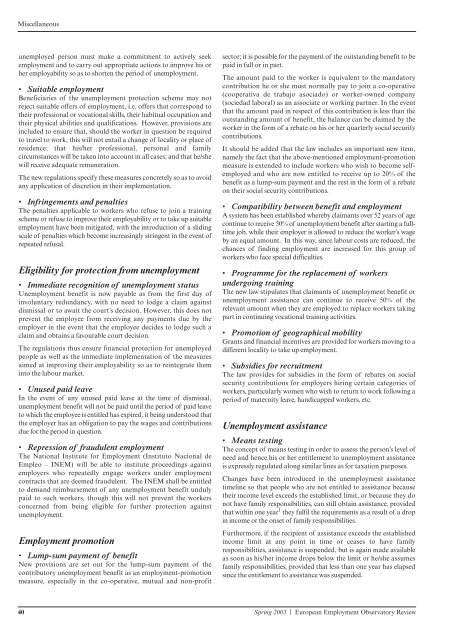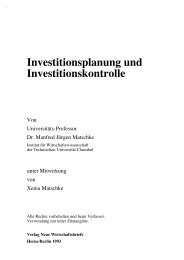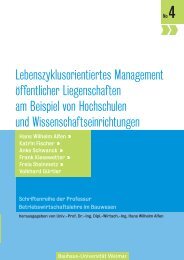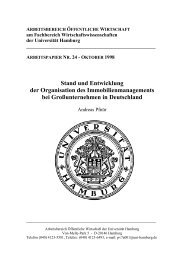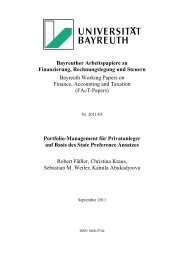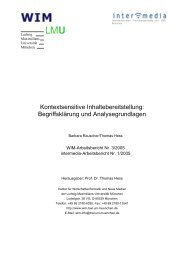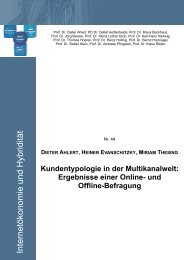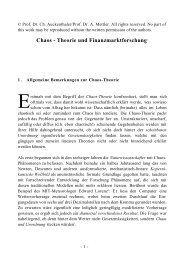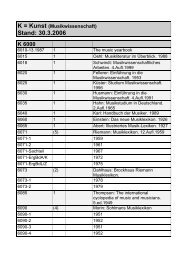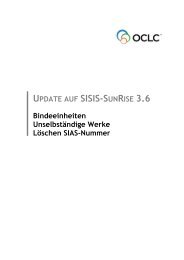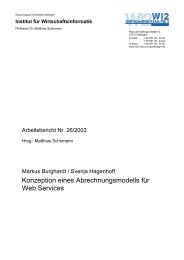FRANCE The
FRANCE The
FRANCE The
You also want an ePaper? Increase the reach of your titles
YUMPU automatically turns print PDFs into web optimized ePapers that Google loves.
Miscellaneous<br />
unemployed person must make a commitment to actively seek<br />
employment and to carry out appropriate actions to improve his or<br />
her employability so as to shorten the period of unemployment.<br />
• Suitable employment<br />
Beneficiaries of the unemployment protection scheme may not<br />
reject suitable offers of employment, i.e. offers that correspond to<br />
their professional or vocational skills, their habitual occupation and<br />
their physical abilities and qualifications. However, provisions are<br />
included to ensure that, should the worker in question be required<br />
to travel to work, this will not entail a change of locality or place of<br />
residence; that his/her professional, personal and family<br />
circumstances will be taken into account in all cases; and that he/she<br />
will receive adequate remuneration.<br />
<strong>The</strong> new regulations specify these measures concretely so as to avoid<br />
any application of discretion in their implementation.<br />
• Infringements and penalties<br />
<strong>The</strong> penalties applicable to workers who refuse to join a training<br />
scheme or refuse to improve their employability or to take up suitable<br />
employment have been mitigated, with the introduction of a sliding<br />
scale of penalties which become increasingly stringent in the event of<br />
repeated refusal.<br />
Eligibility for protection from unemployment<br />
• Immediate recognition of unemployment status<br />
Unemployment benefit is now payable as from the first day of<br />
involuntary redundancy, with no need to lodge a claim against<br />
dismissal or to await the court’s decision. However, this does not<br />
prevent the employee from receiving any payments due by the<br />
employer in the event that the employee decides to lodge such a<br />
claim and obtains a favourable court decision.<br />
<strong>The</strong> regulations thus ensure financial protection for unemployed<br />
people as well as the immediate implementation of the measures<br />
aimed at improving their employability so as to reintegrate them<br />
into the labour market.<br />
• Unused paid leave<br />
In the event of any unused paid leave at the time of dismissal,<br />
unemployment benefit will not be paid until the period of paid leave<br />
to which the employee is entitled has expired, it being understood that<br />
the employer has an obligation to pay the wages and contributions<br />
due for the period in question.<br />
• Repression of fraudulent employment<br />
<strong>The</strong> National Institute for Employment (Instituto Nacional de<br />
Empleo – INEM) will be able to institute proceedings against<br />
employers who repeatedly engage workers under employment<br />
contracts that are deemed fraudulent. <strong>The</strong> INEM shall be entitled<br />
to demand reimbursement of any unemployment benefit unduly<br />
paid to such workers, though this will not prevent the workers<br />
concerned from being eligible for further protection against<br />
unemployment.<br />
Employment promotion<br />
• Lump-sum payment of benefit<br />
New provisions are set out for the lump-sum payment of the<br />
contributory unemployment benefit as an employment-promotion<br />
measure, especially in the co-operative, mutual and non-profit<br />
sector; it is possible for the payment of the outstanding benefit to be<br />
paid in full or in part.<br />
<strong>The</strong> amount paid to the worker is equivalent to the mandatory<br />
contribution he or she must normally pay to join a co-operative<br />
(cooperativa de trabajo asociado) or worker-owned company<br />
(sociedad laboral) as an associate or working partner. In the event<br />
that the amount paid in respect of this contribution is less than the<br />
outstanding amount of benefit, the balance can be claimed by the<br />
worker in the form of a rebate on his or her quarterly social security<br />
contributions.<br />
It should be added that the law includes an important new item,<br />
namely the fact that the above-mentioned employment-promotion<br />
measure is extended to include workers who wish to become selfemployed<br />
and who are now entitled to receive up to 20% of the<br />
benefit as a lump-sum payment and the rest in the form of a rebate<br />
on their social security contributions.<br />
• Compatibility between benefit and employment<br />
A system has been established whereby claimants over 52 years of age<br />
continue to receive 50% of unemployment benefit after starting a fulltime<br />
job, while their employer is allowed to reduce the worker’s wage<br />
by an equal amount. In this way, since labour costs are reduced, the<br />
chances of finding employment are increased for this group of<br />
workers who face special difficulties.<br />
• Programme for the replacement of workers<br />
undergoing training<br />
<strong>The</strong> new law stipulates that claimants of unemployment benefit or<br />
unemployment assistance can continue to receive 50% of the<br />
relevant amount when they are employed to replace workers taking<br />
part in continuing vocational training activities.<br />
• Promotion of geographical mobility<br />
Grants and financial incentives are provided for workers moving to a<br />
different locality to take up employment.<br />
• Subsidies for recruitment<br />
<strong>The</strong> law provides for subsidies in the form of rebates on social<br />
security contributions for employers hiring certain categories of<br />
workers, particularly women who wish to return to work following a<br />
period of maternity leave, handicapped workers, etc.<br />
Unemployment assistance<br />
• Means testing<br />
<strong>The</strong> concept of means testing in order to assess the person’s level of<br />
need and hence his or her entitlement to unemployment assistance<br />
is expressly regulated along similar lines as for taxation purposes.<br />
Changes have been introduced in the unemployment assistance<br />
timeline so that people who are not entitled to assistance because<br />
their income level exceeds the established limit, or because they do<br />
not have family responsibilities, can still obtain assistance, provided<br />
that within one year 1 they fulfil the requirements as a result of a drop<br />
in income or the onset of family responsibilities.<br />
Furthermore, if the recipient of assistance exceeds the established<br />
income limit at any point in time or ceases to have family<br />
responsibilities, assistance is suspended, but is again made available<br />
as soon as his/her income drops below the limit or he/she assumes<br />
family responsibilities, provided that less than one year has elapsed<br />
since the entitlement to assistance was suspended.<br />
40 Spring 2003 | European Employment Observatory Review


